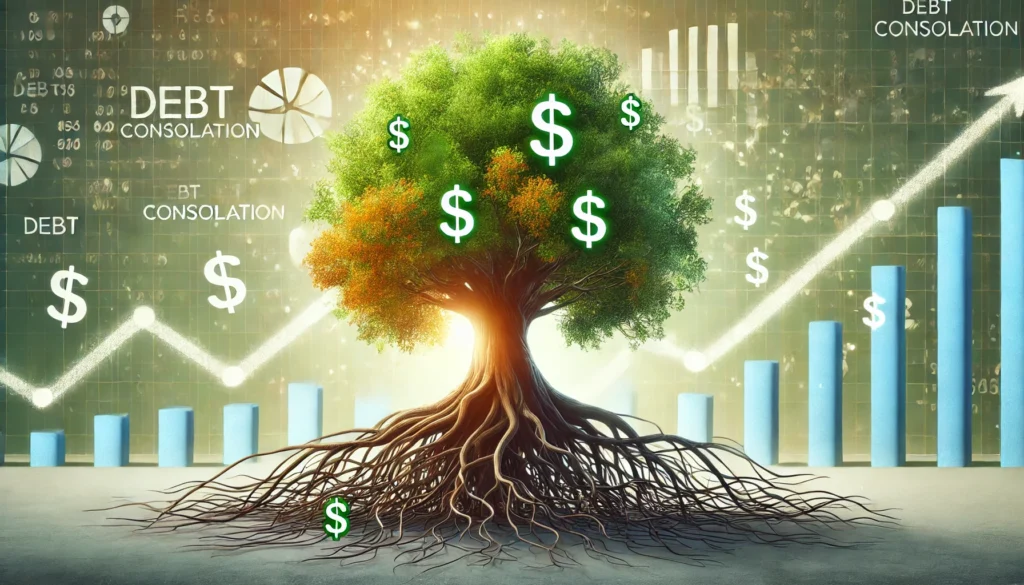Understanding Student Loan Debt and the Appeal of Consolidation
Student loan debt is an ever-growing financial challenge for millions of borrowers. The cost of higher education has soared over the past few decades, leaving graduates burdened with significant debt that can take years, or even decades, to repay. Many borrowers seek solutions to make repayment more manageable, and debt consolidation is often one of the first options they consider. But is debt consolidation a good idea? To answer this question, it is important to understand the mechanics of student loan consolidation, its potential advantages, and its drawbacks.
You may also like: Federal Direct Consolidation Loan: A Smart Strategy to Simplify Student Debt

The Loan Consolidation Definition and How It Works
At its core, loan consolidation involves combining multiple student loans into a single loan with a new interest rate and repayment terms. This process simplifies repayment by reducing the number of monthly payments and often results in a lower monthly payment due to an extended loan term. Federal student loan consolidation is offered through the Direct Consolidation Loan program, while private lenders also provide consolidation options.
Federal loan consolidation allows borrowers to merge their federal loans into one, with the new interest rate being a weighted average of the previous loans’ rates, rounded up to the nearest one-eighth of a percent. Private loan consolidation, often referred to as student loan refinancing, involves taking out a new loan from a private lender to pay off existing loans, potentially at a lower interest rate. Each method has its own pros and cons, which must be carefully considered.

The Benefits of a Consolidation Loan for Student Borrowers
One of the primary benefits of a consolidation loan is the simplification of loan repayment. Managing multiple loans with varying due dates, interest rates, and servicers can be overwhelming, leading to missed payments and financial strain. Consolidation reduces this complexity by merging debts into a single loan, making it easier to track payments and stay on top of obligations.
Another advantage is the potential for lower monthly payments. By extending the repayment term, borrowers can reduce their monthly financial burden, freeing up cash flow for other essential expenses. Additionally, federal loan consolidation provides access to income-driven repayment plans and loan forgiveness programs, which can be highly beneficial for borrowers struggling with large debt loads.
For those considering private student loan refinancing, securing a lower interest rate is a major incentive. If a borrower has improved their credit score or financial standing since taking out their original loans, they may qualify for a reduced interest rate, which can result in significant savings over time.

Is a Consolidation Loan a Good Idea for Everyone?
While the advantages of consolidation are appealing, it is not the right choice for everyone. One of the key considerations is the total cost of the loan over time. While extending the repayment term lowers monthly payments, it often results in higher total interest paid over the life of the loan. This means that while the immediate financial relief is beneficial, the long-term cost may outweigh the short-term savings.
Another drawback to federal loan consolidation is the potential loss of borrower benefits. Certain loans come with perks such as interest rate discounts, principal rebates, or unique repayment options that may not carry over after consolidation. Borrowers should carefully review their current loan terms before proceeding.
For those consolidating with a private lender, the risks can be even greater. Refinancing federal loans into a private loan means forfeiting federal protections, such as deferment, forbearance, and loan forgiveness programs. This is a critical consideration for borrowers in public service roles who may be eligible for Public Service Loan Forgiveness (PSLF) but would lose eligibility after refinancing.
Pros and Cons of Debt Consolidation for Student Loans
Debt consolidation offers both benefits and challenges. To fully understand its impact, it is essential to weigh the pros and cons of loan consolidation in detail.
Advantages of Student Loan Consolidation
- Simplified Repayment: One monthly payment instead of managing multiple loans reduces financial stress and the likelihood of missed payments.
- Potential for Lower Monthly Payments: Extending the repayment period can reduce monthly obligations, making it easier to manage household expenses.
- Access to Income-Driven Repayment Plans: Federal consolidation provides access to repayment plans based on income, which can be helpful for borrowers with fluctuating earnings.
- Eligibility for Loan Forgiveness: Some borrowers may gain access to loan forgiveness programs through consolidation.
- Improved Credit Score: A more manageable repayment structure can lead to on-time payments, positively impacting credit scores.
Disadvantages of Debt Consolidation Loans
- Higher Total Interest Costs: Extending the repayment term often results in paying more interest over time.
- Loss of Certain Borrower Benefits: Some original loan benefits, such as interest rate discounts or principal rebates, may be lost.
- Forfeiture of Federal Protections: Refinancing federal loans with a private lender eliminates federal benefits like PSLF and deferment options.
- No Guaranteed Lower Interest Rates: While refinancing can secure lower rates, federal loan consolidation does not necessarily reduce interest costs.
Is It Smart to Consolidate Debt? Evaluating Personal Financial Situations
Deciding whether to consolidate student loans requires a careful evaluation of one’s personal financial situation. Borrowers should assess their current loan terms, interest rates, financial stability, and long-term repayment goals. If reducing monthly payments is a priority, consolidation may be a viable solution. However, those who qualify for loan forgiveness or other federal benefits should weigh the risks before proceeding.
Borrowers with strong credit and stable income may benefit from refinancing with a private lender to secure a lower interest rate. However, those who anticipate needing federal protections should carefully consider the trade-offs before making a final decision.
Frequently Asked Questions (FAQ)
Is debt consolidation a good idea for long-term financial health?
Debt consolidation can be beneficial for long-term financial health if managed properly. By combining multiple debts into a single payment, individuals often find it easier to track and manage their obligations. However, it is crucial to ensure that the consolidation loan does not extend repayment terms excessively, as this could lead to higher overall interest costs. Understanding the pros and cons of debt consolidation is essential before committing, as some borrowers may not benefit if they lack the discipline to avoid accruing new debt. Those who use consolidation strategically—by securing lower interest rates and maintaining consistent payments—can experience long-term financial stability.
What are the key pros and cons of debt consolidation?
One of the main benefits of a consolidation loan is the ability to simplify multiple payments into a single, predictable monthly obligation. This can help reduce stress and improve budgeting efforts. However, the disadvantages of debt consolidation loans include the risk of longer repayment terms, which may result in paying more interest over time. Additionally, some lenders charge fees for loan consolidation, further increasing costs. Evaluating credit consolidation pros and cons is crucial to determining whether the benefits outweigh the potential drawbacks in your specific financial situation.
Is a consolidation loan a good idea if I have a low credit score?
For individuals with lower credit scores, securing favorable terms on a consolidation loan may be challenging. While some lenders offer consolidation loans to borrowers with less-than-perfect credit, these often come with higher interest rates. Understanding the disadvantages of consolidation loans in this context is important, as a high-interest consolidation loan might not provide meaningful financial relief. If improving credit is a priority, focusing on timely payments and reducing overall debt levels before consolidating might be a smarter approach. Weighing the debt consolidation loan pros and cons against alternative strategies, such as negotiating directly with creditors, is recommended.
How does debt consolidation impact my credit score?
Debt consolidation can have both positive and negative effects on your credit score. Initially, applying for a consolidation loan might result in a temporary dip in your credit due to a hard inquiry. However, if used wisely, consolidation can improve credit over time by reducing credit utilization and ensuring consistent, on-time payments. The pros and cons of loan consolidation should be carefully considered, as missing payments on a consolidation loan could hurt your score. On the other hand, responsible management of a consolidation loan can demonstrate financial responsibility and ultimately boost creditworthiness.
What are the disadvantages of debt consolidation loans compared to other debt relief options?
The disadvantages of debt consolidation loans often depend on individual financial situations. While consolidation may simplify payments, it does not reduce the total amount owed, unlike debt settlement or bankruptcy. Additionally, some borrowers end up paying more in interest over time, especially if they opt for extended repayment terms. Examining credit consolidation pros and cons alongside alternatives such as negotiating lower interest rates with creditors or increasing income to pay down debt more aggressively is advisable. It is also important to avoid taking on new debt after consolidating, as this can lead to an even worse financial situation.
Is it smart to consolidate credit card debt with a personal loan?
Using a personal loan to consolidate credit card debt can be a wise move if the loan offers a significantly lower interest rate than existing credit card balances. This approach can help reduce monthly payments and accelerate debt repayment. However, it is essential to consider the disadvantages of debt consolidation loans, such as potential origination fees and the temptation to continue using credit cards after consolidation. Asking, “Is it a good idea to consolidate credit card debt?” depends on your ability to avoid accumulating new balances and sticking to a disciplined repayment plan. Borrowers should also compare multiple lenders to secure the most favorable terms.
Is bill consolidation a good idea for reducing financial stress?
Bill consolidation can be an effective strategy for reducing financial stress by streamlining multiple payments into a single monthly obligation. This simplification can make budgeting easier and minimize the risk of missed payments. However, assessing the pros and cons of debt consolidation is necessary, as some consolidation options may lead to higher total interest payments. The disadvantages of consolidation loans also include the potential loss of certain benefits, such as promotional 0% interest offers on credit cards. It is crucial to weigh these factors and ensure that consolidation aligns with long-term financial goals before proceeding.
What should I consider before consolidating my debt?
Before consolidating debt, it is important to evaluate factors such as interest rates, repayment terms, and total cost over time. Comparing the benefits of a consolidation loan with alternative solutions can help determine the best course of action. Understanding the disadvantages of debt consolidation is key, as some borrowers end up paying more due to extended loan terms. Additionally, borrowers should consider their spending habits—if excessive spending led to debt accumulation in the first place, addressing the root cause is essential. Being mindful of these factors can prevent future financial difficulties.
Is it smart to consolidate debt if I plan to take out a mortgage soon?
If you are planning to apply for a mortgage in the near future, consolidating debt can have mixed effects on your borrowing power. While reducing credit card balances through consolidation may improve your debt-to-income ratio, opening a new loan can temporarily lower your credit score. Assessing the pros and cons of loan consolidation in this context is critical, as lenders evaluate credit history and outstanding debt when approving mortgage applications. It may be beneficial to consolidate debt well in advance of applying for a mortgage to allow time for credit recovery. Understanding the potential impact of debt consolidation on future borrowing is essential to making an informed decision.
How can I avoid the disadvantages of debt consolidation loans?
To avoid the common disadvantages of debt consolidation loans, it is essential to choose a loan with a competitive interest rate and favorable terms. Borrowers should also be cautious of hidden fees and ensure they are not extending repayment unnecessarily. A strategic approach involves comparing multiple lenders, negotiating terms, and maintaining strict financial discipline post-consolidation. Recognizing the pros and cons of debt consolidation can help individuals avoid common pitfalls, such as accumulating new debt after consolidating. Proper planning and financial responsibility are key to making consolidation a truly beneficial solution.
Conclusion: Making an Informed Decision on Student Loan Consolidation
The question of whether debt consolidation is a good idea for student loans does not have a one-size-fits-all answer. While consolidation can simplify repayment and lower monthly obligations, it also comes with potential drawbacks, such as increased total interest costs and loss of federal benefits. Borrowers should thoroughly research their options, consult financial advisors if needed, and carefully evaluate their financial goals before committing to consolidation.
For those who prioritize lower monthly payments and ease of management, consolidation may provide the relief they need. However, those who value long-term cost savings or federal loan protections should explore alternative repayment strategies. By weighing the pros and cons of debt consolidation and considering personal financial circumstances, borrowers can make informed choices that align with their long-term financial well-being.
student loan repayment, loan consolidation options, managing student debt, financial planning for graduates, debt management strategies, student loan refinancing, public service loan forgiveness, federal loan consolidation, student loan interest rates, private loan refinancing, income-driven repayment plans, loan forgiveness programs, credit score impact, financial stability, debt relief solutions, education finance, borrower protections, personal finance planning, college graduate finances, interest rate strategies
Further Reading:
5 Things to Know Before Consolidating Federal Student Loans
Federal student loan repayments resume in October — should you consolidate your loans?
How to manage student loan debt in uncertain times
The information provided in this article is for general informational purposes only and is not intended to constitute financial, investment, legal, tax, or other professional advice. The content should not be relied upon for making any financial or investment decisions. Readers are encouraged to consult with licensed professionals, such as financial advisors, attorneys, or tax experts, to obtain personalized advice tailored to their individual circumstances. The author and publisher disclaim any liability for any actions taken or not taken based on the information provided in this article.





